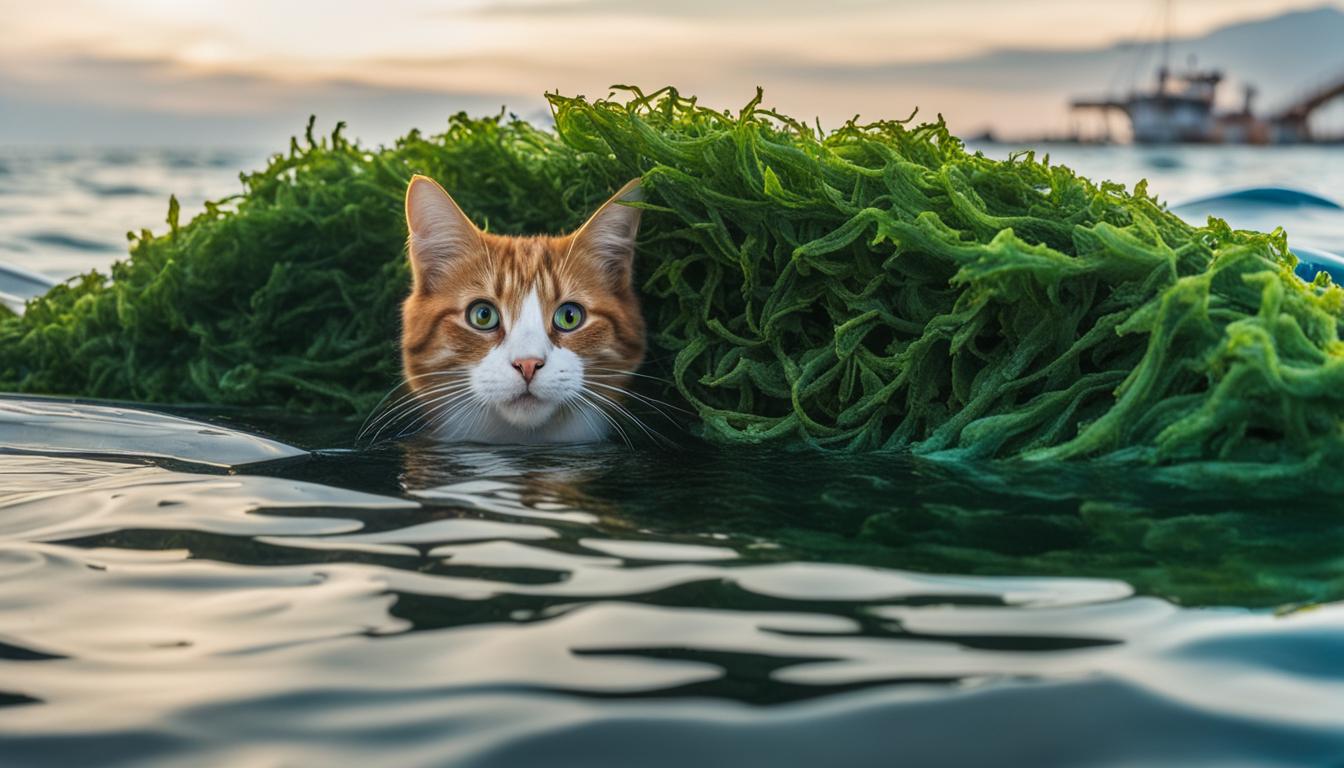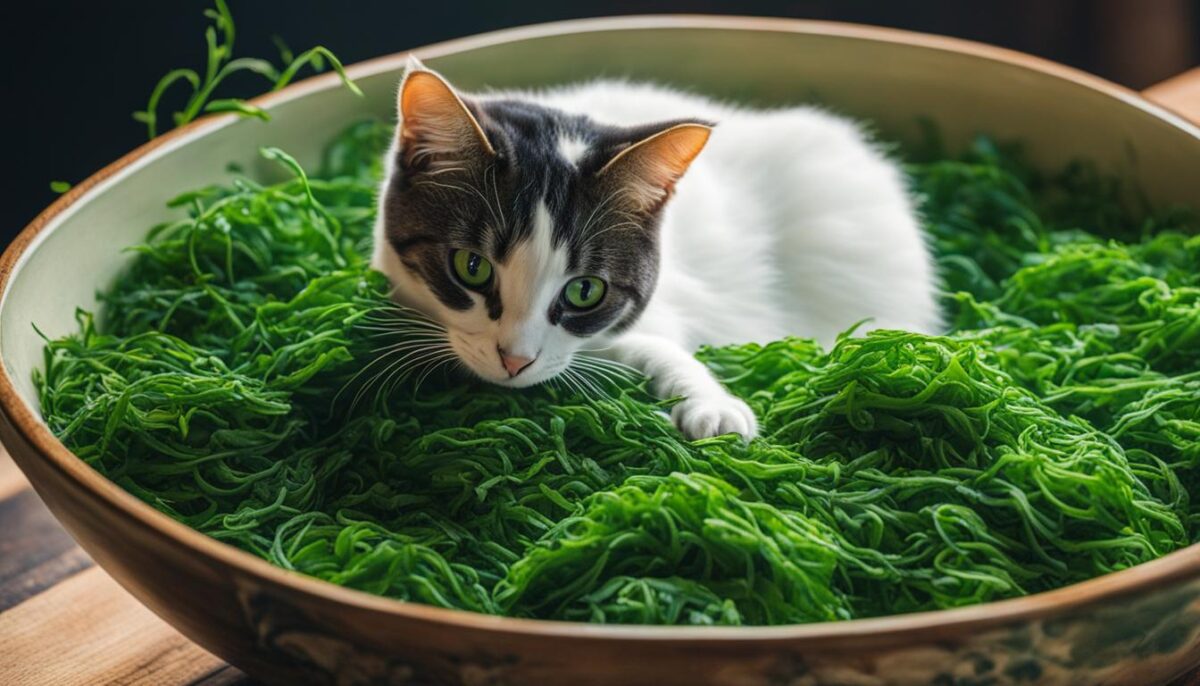Are you wondering if cats can eat seaweed? If you’ve ever strolled along the beach and seen cats nibbling on seaweed, you may be curious about whether it’s safe for them. Let’s dive into the world of seaweed and find out if it’s a suitable snack for our feline friends!
Key Takeaways:
- Seaweed can provide nutritional benefits for cats, but it’s important to ensure their safety and wellbeing.
- Consult with a veterinarian to determine if seaweed is suitable for your cat.
- Not all types of seaweed are safe for cats, and some may contain toxins or be contaminated.
- Introduce seaweed into your cat’s diet in moderation and monitor for any adverse reactions.
- Consider alternative options if your cat has sensitivities or allergies to seaweed.
The Benefits of Seaweed for Cats
Seaweed, such as kelp, can provide several benefits when incorporated into a cat’s diet. This nutrient-rich marine plant is a natural source of essential minerals like iodine, sodium, and potassium, which are important for maintaining optimal health in cats. Seaweed also contains antioxidants, vitamins, and other minerals, including calcium and iron, which can support a cat’s immune system, promote healthy skin and coat, and aid in digestion.
Introducing seaweed into a cat’s diet can provide a range of health benefits. For example, the iodine present in seaweed plays a crucial role in maintaining a cat’s thyroid health, which regulates their metabolism. Additionally, the minerals found in seaweed can contribute to strong bones, teeth, and overall musculoskeletal health.
It is important to note that while seaweed can be beneficial, it should be introduced in moderation. Too much iodine from excessive seaweed consumption can have adverse effects on a cat’s health. Consulting with a veterinarian is essential to determine the proper amount of seaweed to incorporate into a cat’s diet for optimal results.
Table: Nutritional Content of Seaweed
| Minerals | Amount per 100g |
|---|---|
| Iodine | 7800 mcg |
| Sodium | 233 mg |
| Potassium | 89 mg |
| Calcium | 168 mg |
| Iron | 2.8 mg |
Note: These values are approximate and may vary depending on the type of seaweed.
Is Seaweed Safe for Cats?
While seaweed can provide nutritional benefits, it is important to ensure that it is safe for cats to consume. Not all types of seaweed are suitable for cats, and some may contain toxins or be contaminated with harmful substances. Cats may also have different sensitivities or allergies to certain types of seaweed. It is recommended to consult with a veterinarian before introducing seaweed into a cat’s diet to ensure their safety and wellbeing.
Seaweed contains various nutrients that can be beneficial for cats, such as iodine, sodium, potassium, antioxidants, vitamins, and minerals. However, it is crucial to understand that these benefits can come with potential risks. Certain types of seaweed may contain high levels of iodine, which can be harmful to cats if consumed in excessive amounts. Cats with pre-existing medical conditions, such as thyroid issues, may be particularly sensitive to the iodine content in seaweed.
Moreover, seaweed can also be contaminated with pollutants or toxins from the ocean, posing a risk to cats if ingested. It is important to monitor your cat’s consumption of seaweed and seek veterinary advice if you notice any adverse reactions or symptoms. Your veterinarian can assess your cat’s overall health and provide guidance on whether seaweed is safe for them to consume, considering factors such as their age, breed, and any underlying medical conditions.
Table: Potential Risks of Cats Eating Seaweed
| Risk Factors | Description |
|---|---|
| Allergies and Sensitivities | Cats may have allergies or sensitivities to certain types of seaweed, leading to digestive issues or skin problems. |
| Iodine Toxicity | Certain types of seaweed can contain high levels of iodine, which can be harmful to cats, especially those with thyroid issues. |
| Contamination | Seaweed from polluted waters may contain harmful substances, such as heavy metals or toxins, which can be dangerous if ingested by cats. |
Before incorporating seaweed into your cat’s diet, it is crucial to do thorough research and consult with a veterinarian who can provide personalized advice based on your cat’s specific needs. They can help determine if seaweed is safe for your cat and recommend appropriate alternatives if needed.
Alternatives to Seaweed for Cats
If you’re looking for alternatives to feeding your cat seaweed or if your feline friend has any sensitivities or allergies to it, there are other options available that can provide similar nutritional benefits. Commercial cat food products often include ingredients that offer the same advantages as seaweed, such as fish or seafood. These products are specifically formulated to meet the dietary needs of cats and can be a safe and convenient alternative to seaweed.
Feeding your cat a balanced and complete diet is crucial for their overall health and well-being. While seaweed can be a beneficial addition to their diet, it should not replace their primary source of nutrition. Cats are obligate carnivores, meaning they require a diet primarily consisting of animal-based protein. Seaweed can be offered as a supplement or occasional treat, but it should not be the sole source of their nutrition.
It’s always a good idea to consult with your veterinarian before making any significant changes to your cat’s diet. They can provide guidance on the best options for your cat’s specific dietary needs and help ensure their safety and well-being. By considering alternative options and consulting with a professional, you can provide your cat with a balanced and nutritious diet that suits their individual needs.
Table: Comparison of Seaweed and Alternative Cat Food
| Seaweed | Alternative Cat Food |
|---|---|
| Contains various nutrients beneficial for cats | Formulated to meet the nutritional needs of cats |
| Can be offered as a supplement or treat | Can be fed as a complete and balanced diet |
| May contain high levels of iodine | Controlled iodine content |
| May pose potential risks if not introduced properly | Safe and convenient alternative |
Remember, your cat’s health is a top priority. It’s essential to make informed decisions about their diet and consult with a professional to ensure they’re receiving the appropriate nutrition. Whether you choose seaweed or alternative cat food, your furry friend will appreciate your care and consideration.
Seaweed Supplements for Cats
While incorporating seaweed into a cat’s diet can provide nutritional benefits, there are also seaweed supplements available specifically designed for cats. These supplements offer a convenient way to ensure that your cat receives the essential nutrients found in seaweed in a concentrated form.
Seaweed supplements for cats are formulated to support their overall health and well-being. They are typically rich in essential minerals like iodine, sodium, and potassium, which are important for maintaining healthy bodily functions. Additionally, these supplements may contain antioxidants, vitamins, and other beneficial compounds that can support the immune system, promote healthy skin and coat, and aid in digestion.
When considering seaweed supplements for your cat, it is important to consult with a veterinarian to determine the appropriate dosage and ensure that the specific supplement is safe and suitable for your cat’s individual needs. Each cat is unique, and their dietary requirements may vary. Your veterinarian can provide personalized recommendations based on your cat’s health, age, and any specific conditions they may have.
| Benefits of Seaweed Supplements for Cats | Recommended Dosage | Important Considerations |
|---|---|---|
| 1. Provides essential minerals and nutrients | Follow the recommended dosage instructions provided by the manufacturer or your veterinarian. | 1. Consult with a veterinarian before starting your cat on any new supplement. 2. Monitor your cat’s response to the supplement and consult with a veterinarian if you notice any adverse reactions. 3. Seaweed supplements should not be a replacement for a balanced and complete cat food diet. |
| 2. Supports immune system health | – | – |
| 3. Promotes healthy skin and coat | – | – |
| 4. Aids in digestion | – | – |
Incorporating seaweed supplements into your cat’s routine can be a valuable addition to their overall diet. However, it is essential to use them as directed and in combination with a balanced cat food that meets their specific nutritional needs. By consulting with a veterinarian and providing appropriate care, you can ensure that your cat remains healthy and happy.
Seaweed and the Feline Diet
Seaweed can be a beneficial addition to a cat’s diet, providing various nutrients that can support their overall health. However, it is important to remember that cats are obligate carnivores, which means their diet should primarily consist of animal-based protein. Seaweed should not be the sole source of their nutrition, but rather a supplement or occasional treat.
When offering seaweed to your cat, it is essential to do so in moderation. While seaweed is rich in iodine, sodium, potassium, antioxidants, vitamins, and minerals, excessive amounts can be harmful to cats. Some types of seaweed may also contain pollutants or toxins from the ocean, which can pose a risk to their health.
If you choose to introduce seaweed into your cat’s diet, it is recommended to consult with a veterinarian. They can provide guidance on the appropriate types and amounts of seaweed to offer based on your cat’s specific needs. Additionally, they can help you create a balanced and complete diet plan that meets all of your cat’s nutritional requirements.
Benefits of Seaweed for Cats
Seaweed contains a range of nutrients that can benefit cats’ overall health. Here are some of the potential benefits:
- Supports the immune system: Seaweed is rich in antioxidants, which can help strengthen cats’ immune system and protect against oxidative stress.
- Promotes healthy skin and coat: The vitamins and minerals found in seaweed, such as vitamin A and omega-3 fatty acids, can contribute to healthy skin and a shiny coat.
- Aids in digestion: Seaweed is a source of dietary fiber, which can promote healthy digestion in cats and help prevent constipation.
While seaweed can offer these benefits, it should always be introduced with caution and under the guidance of a veterinary professional. They can ensure that seaweed is safe for your cat and recommend the appropriate amount to include in their diet.
| Benefits of Seaweed for Cats | How it Helps |
|---|---|
| Supports the immune system | Rich in antioxidants that strengthen the immune system and protect against oxidative stress |
| Promotes healthy skin and coat | Vitamins and minerals contribute to healthy skin and a shiny coat |
| Aids in digestion | Dietary fiber promotes healthy digestion and prevents constipation |
Potential Risks of Cats Eating Seaweed
While seaweed can provide nutritional benefits for cats, there are potential risks associated with their consumption of this marine plant. It is important to be aware of these risks and take necessary precautions to ensure the well-being of your feline friend.
Iodine Toxicity
One of the main concerns with cats eating seaweed is the potential for iodine toxicity. Some types of seaweed, such as kelp, contain high levels of iodine, which can be harmful to cats in excessive amounts. An excessive intake of iodine can disrupt thyroid function and lead to serious health issues. It is crucial to monitor your cat’s seaweed consumption and avoid feeding them large quantities to mitigate the risk of iodine toxicity.
Contaminants and Toxins
Seaweed can also be contaminated with pollutants or toxins from the ocean. Because seaweed acts as a bioaccumulator, it absorbs both beneficial nutrients and harmful substances from its surrounding environment. These contaminants can include heavy metals, pesticides, and microorganisms that may pose health risks to your cat if ingested. It is essential to ensure that any seaweed you feed your cat is from a trusted and reputable source to minimize the potential exposure to contaminants and toxins.
Allergic Reactions
Just like humans, cats can have allergies or sensitivities to certain foods, including seaweed. Even if a specific type of seaweed is generally considered safe for cats, an individual cat may still have an adverse reaction to it. Allergic reactions can manifest as gastrointestinal issues, skin problems, or respiratory symptoms. If you notice any unusual signs or symptoms after introducing seaweed into your cat’s diet, it is recommended to consult with a veterinarian to determine whether your cat may be experiencing an allergic reaction.
In conclusion, while seaweed can offer nutritional benefits for cats, it is crucial to be aware of the potential risks associated with their consumption. Monitoring iodine levels, choosing seaweed from reputable sources, and being vigilant for any signs of allergies or adverse reactions can help ensure the safety and well-being of your beloved feline companion.
Conclusion
Seaweed can be a beneficial addition to your cat’s diet, providing valuable nutrients and supporting their overall health. However, it is important to prioritize their safety and wellbeing when introducing seaweed into their meals.
Consulting with a veterinarian is highly recommended to ensure that seaweed is suitable for your cat. They can provide guidance on the right amount to include and whether your cat has any sensitivities or allergies that should be taken into account.
If you are unsure about feeding your cat seaweed or if they have any specific dietary needs or restrictions, there are alternative options available. Commercial cat food products often incorporate ingredients that offer similar nutritional benefits to seaweed, such as fish or seafood. These specially formulated products can provide a safe and convenient alternative.
Remember, while seaweed can be a healthy addition to your cat’s diet, it should not replace a balanced and complete cat food that meets their dietary requirements as obligate carnivores. By considering their dietary needs and potential risks, you can make informed decisions about feeding your feline friend seaweed.
FAQ
Can cats eat seaweed?
Yes, cats can eat seaweed, but it should be introduced into their diet in moderation and with caution.
What are the benefits of seaweed for cats?
Seaweed is a good source of essential nutrients such as iodine, sodium, potassium, antioxidants, vitamins, and minerals. It can support their immune system, promote healthy skin and coat, and aid in digestion.
Is seaweed safe for cats?
Seaweed can be safe for cats, but not all types are suitable for them. Some may contain toxins or be contaminated with harmful substances. It is important to consult with a veterinarian before feeding seaweed to your cat.
Are there alternatives to seaweed for cats?
Yes, there are alternative options such as commercial cat food products that include fish or seafood, which provide similar nutritional benefits as seaweed and are specifically formulated for cats.
Are there seaweed supplements for cats?
Yes, there are seaweed supplements available specifically designed for cats. These supplements provide the nutritional benefits of seaweed in a concentrated form. However, it is important to consult with a veterinarian before giving any supplements to your cat.
How does seaweed fit into a cat’s diet?
Seaweed should not be the sole source of a cat’s nutrition as they are obligate carnivores. It can be offered as a supplement or occasional treat, but a balanced and complete cat food that meets their dietary needs should be their primary source of nutrition.
What are the potential risks of cats eating seaweed?
Certain types of seaweed may contain high levels of iodine, which can be harmful to cats in excessive amounts. Seaweed may also be contaminated with pollutants or toxins from the ocean. It is important to monitor their consumption and seek veterinary advice if any adverse reactions occur.


